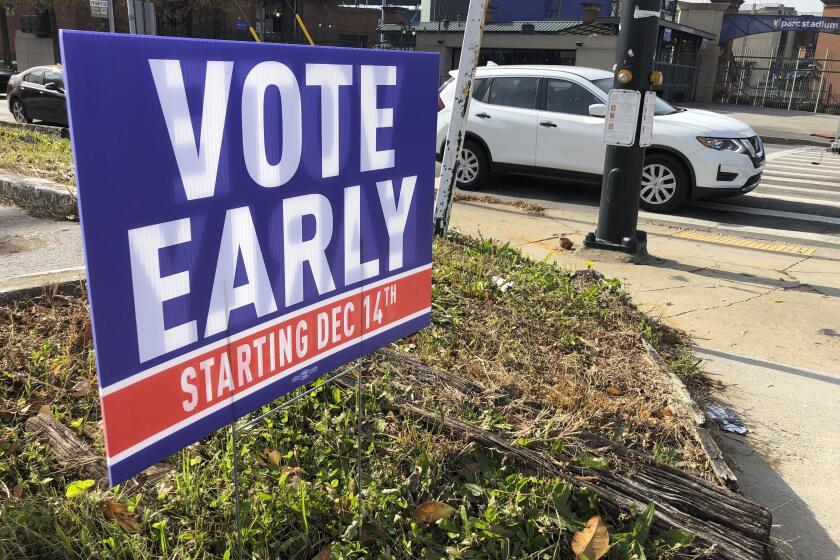Commandos Provide Hope for the Safety of Voters in Ramadi
RAMADI, Iraq — In the otherwise disappointing story of the Iraqi security forces, the Iraqi army’s commando unit has been an exception, fighting ably beside American troops in Fallouja.
And now the unit -- comprising mostly Shiite Muslims and smaller numbers of Sunni Arabs and Kurds -- is taking on the dangerous task of providing security Sunday at polling places in this rebellious city.
Several hundred commandos were given the assignment after all of Ramadi’s 1,000 policemen abandoned their posts because of threats against them and their families by insurgents who have carried out kidnappings and beheadings.
“They’re a ray of hope,” said Marine Lt. Brian Iglesias, who has worked with the commandos as officer-in-charge of the Marine contingent guarding the Al Anbar province government center.
As U.S. and Iraqi officials Friday began completing plans for the national election Sunday, commando teams took positions at strategic points throughout Ramadi.
“I believe in two things: God and protecting my homeland,” said commando Lt. Ali Stare Tama, 24, of Basra.
The commandos, who earn about $300 a month -- a living wage in Iraq -- insist that religious or ethnic differences are irrelevant.
“We fight together, like the Americans,” Tama said.
Most served in the army under Saddam Hussein; the small Kurdish contingent fought with the U.S. during the 1991 Persian Gulf War and the 2003 invasion. They have received additional training from the Marines and Navy SEALs.
“These guys are trained to kill even though they are a bit undisciplined,” Staff Sgt. Sammy Villarreal said. “They’re aggressive and they’ve seen action before so they know what to expect.”
After the policemen abandoned their posts here, the U.S. had little choice but to call in the commandos.
U.S. troops acknowledge that the commandos are known to bully suspects, and don’t understand that people have to be seen as serious threats before they are fired on.
But the Americans say the commandos are trustworthy and unafraid to confront an enemy.
“From what I hear, they’re good to go,” said Capt. Sean Kuehl, an assistant intelligence officer with the 2nd Battalion, 5th Regiment, 1st Marine Division, the unit responsible for maintaining order in much of Ramadi.
As they lounged in a large tent, awaiting orders to deploy into the heart of the city, the commandos played cards, smoked and listened to Arabic music.
Asked what they planned to do with insurgents who try to disrupt the election, several commandos responded by twisting their foot as if stomping out a cigarette, while others cheered.
“The destroyers are no better than thieves,” said commando Hussien Naser Abaied, 26, referring to the insurgents. “We will fight them.”
During the battle to oust insurgents from Fallouja, the commandos were among the 2,000 Iraqi troops who fought beside 10,000 U.S. Marines and soldiers. In the early hours of the offensive, Iraqi units successfully fought insurgents for control of two bridges over the Euphrates River and a strategic city hospital.
For the U.S., the use of the commando unit is part of a shift in thinking about how best to organize the Iraqi security forces.
After Hussein and his Baath Party were toppled, U.S. officials thought it made sense to recruit locally for the police force, that men from a particular city would be motivated to provide security for their hometown.
In Ramadi, where CDs showing scenes of beheadings are hawked on street corners, intimidation has paralyzed the local government and thwarted U.S. plans to pump tens of millions of dollars into reconstruction projects.
Capt. Mike Roach, liaison between the Marines and Iraqi security forces, said that bringing commandos and other forces from outside Ramadi should remove the risk of their families being threatened.
Like nearly all government employees in Al Anbar province, Ramadi police have stopped coming to work, Roach said. The provincial governor, whose office is heavily guarded by Marines is among those who don’t show up for work.
Insurgents have steadily targeted the police in Ramadi. All the police stations, except for one guarded by Marines, have been destroyed. A high-ranking police officer was publicly beheaded this month.
Even when policemen showed up, performance of duties was spotty and none wanted to be seen with Americans.
“They were worthless,” Iglesias said. “They never confronted anyone, never confiscated any weapons, never did anything.”
The commandos, given AK-47s, ammunition and body armor by the Marines, will maintain security inside and around the polling places, with the Marines keeping their distance so the election would have an “Iraqi face.”
“We want people to be able to choose their own leader, for Iraq,” said commando Sgt. Major Khald Hameed Khalf, 38, of Baghdad.
More to Read
Sign up for Essential California
The most important California stories and recommendations in your inbox every morning.
You may occasionally receive promotional content from the Los Angeles Times.








